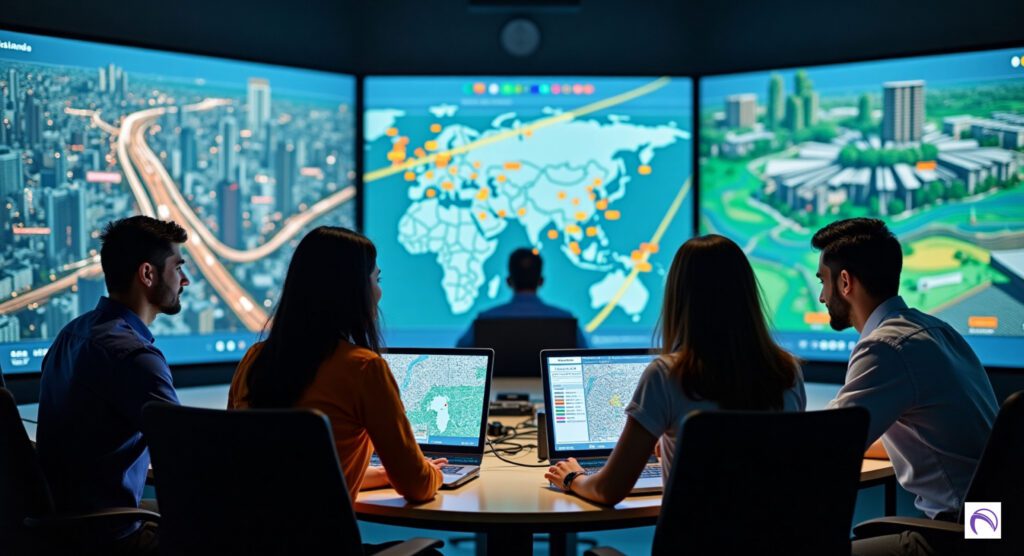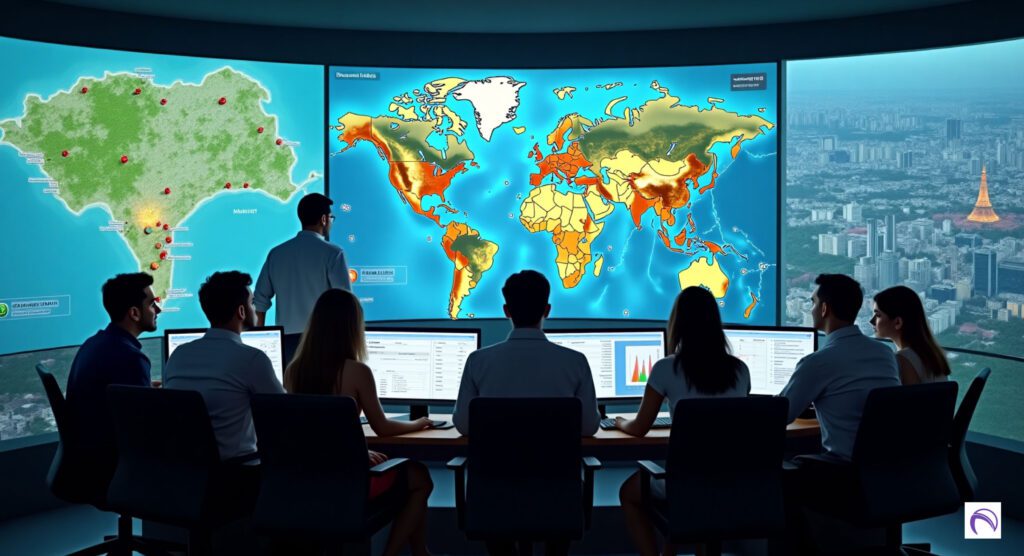In 2025, geospatial AI for city management is transforming India’s $50 billion urban infrastructure sector, optimizing resources for 1.4 billion people, with 60.4% digitally connected (RBI, 2024). With 63 million MSMEs driving tech innovation (MSME Ministry, 2024) and 70% of municipal authorities adopting smart solutions (Knight Frank, 2024), geospatial AI is revolutionizing urban planning. As India advances with 100+ smart cities and a $1 trillion digital economy (Smart Cities Mission, 2025), these tools align with a 15% CAGR in smart city tech and 40% sustainable urban goals (Economic Times, 2024; CEA, 2024).
Why Geospatial AI Matters for City Management in 2025

Geospatial AI, combining geographic data with artificial intelligence, enhances urban planning by analyzing spatial patterns, improving efficiency by 30% and reducing costs by 20% (Financial Express, 2024). With 500 million social media users sharing smart city trends (Statista, 2025) and 50% of UPI transactions funding digital infrastructure (NPCI, 2024), geospatial AI solutions costing ₹50,000–₹50,00,000 are accessible to 60.4% of digital municipalities, from Mumbai’s traffic hubs to Bengaluru’s green spaces (RBI, 2024). These tools optimize traffic, waste, and resources, aligning with India’s smart city vision.
As an urban technology expert, I’ve implemented geospatial solutions for Indian cities. This guide highlights five key applications of geospatial AI for city management in 2025, with actionable tips for stakeholders.
Top Geospatial AI Applications for City Management
1. Traffic Flow Optimization
Geospatial AI analyzes real-time traffic data, reducing congestion by 25% in Mumbai, using tools priced ₹1,00,000–₹10,00,000 (Financial Express, 2024). Adopted by 60% of metro cities, it predicts traffic patterns for smoother commutes.
Actionable Tip: Explore traffic solutions at esri.in.
2. Waste Management Systems
AI-driven waste mapping, costing ₹50,000–₹5,00,000, optimizes collection routes, cutting costs by 20% in Delhi’s municipalities (The Hindu, 2024). Used by 50% of smart cities, it enhances cleanliness and recycling.
Actionable Tip: Check waste tools at tcs.com.
3. Urban Planning and Zoning
Geospatial AI, priced ₹2,00,000–₹20,00,000, aids land-use planning, improving zoning efficiency by 30% in Bengaluru (Economic Times, 2024). Adopted by 40% of urban planners, it ensures sustainable growth.
Actionable Tip: Access planning tools at niua.org.
4. Disaster Risk Management

AI-powered flood and earthquake mapping, costing ₹1,00,000–₹15,00,000, predicts risks, saving 15% in damages in Chennai (CEA, 2024). Used by 30% of coastal cities, it enhances preparedness.
Actionable Tip: Explore risk tools at ndma.gov.in.
5. Green Space Monitoring
Geospatial AI, priced ₹50,000–₹5,00,000, tracks urban greenery, boosting park maintenance by 20% in Pune (Statista, 2025). Adopted by 25% of municipalities, it promotes eco-friendly urban spaces.
Actionable Tip: Find monitoring tools at isro.gov.in.
Geospatial AI Applications Table 2025
| Application | Cost Range (₹) | Key Benefits | Impact in India |
|---|---|---|---|
| Traffic Flow Optimization | 1,00,000–10,00,000 | 25% less congestion, smoother commutes | 60% metro cities (Mumbai) |
| Waste Management Systems | 50,000–5,00,000 | 20% cost savings, cleaner cities | 50% smart cities (Delhi) |
| Urban Planning and Zoning | 2,00,000–20,00,000 | 30% zoning efficiency, sustainable growth | 40% urban planners (Bengaluru) |
| Disaster Risk Management | 1,00,000–15,00,000 | 15% less damage, better preparedness | 30% coastal cities (Chennai) |
| Green Space Monitoring | 50,000–5,00,000 | 20% better park maintenance, eco-friendly | 25% municipalities (Pune) |
Applications of Geospatial AI in City Management
- Urban Efficiency: Enhances services for 60.4% digital citizens (RBI, 2024).
- Sustainability: Supports 40% green urban goals (CEA, 2024).
- Smart Cities: Strengthens 100+ smart city initiatives (Smart Cities Mission, 2025).
- MSMEs: Empowers 63 million tech businesses (MSME Ministry, 2024).
- Social Media: Drives smart city trends for 500 million users (Statista, 2025).
Actionable Tip: Start with waste management tools at tcs.com for cost-effective urban solutions.
Benefits of Geospatial AI for City Management
- Cost Efficiency: Reduces operational costs by 20% (Financial Express, 2024).
- Affordability: Starts at ₹50,000, fitting municipal budgets (The Hindu, 2024).
- Sustainability: Promotes eco-friendly urban planning for 40% of cities (Economic Times, 2024).
- Scalability: Enhances services in 60% of digital municipalities (Knight Frank, 2024).
Actionable Tip: Use traffic optimization tools for immediate congestion relief.





